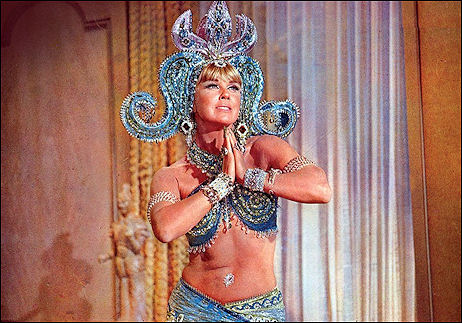In today’s N.Y. Times, director Douglas McGrath ( Infamous, Emma) makes a case for Doris Day, now 87, receiving a special career-honoring Oscar. McGrath writes persuasively and with feeling about Day’s special qualities. She committed to her light-comedy roles, held her own with the likes of James Stewart, Kirk Douglas and James Cagney, etc. But there’s one negative he can’t wave away.
I’m speaking of Day’s ghastly performance in Alfred Hitchcock‘s The Man Who Knew Too Much. I love aspects of this 1956 thriller (the murder in the Marrakech marketplace, the assassination attempt in Albert Hall) but Day’s grating emotionalism makes it a very hard film to watch. She cries, shrieks, trembles, weeps. And when she isn’t losing it, she’s acting pretentiously coy and smug in that patented manner of a 1950s Stepford housewife. Or she’s singing “Que Sera Sera” over and over again.
I’ll give her credit for almost everything else that McGrath brings up, but she’s so awful in Hitchcock’s film that this single performance almost tips over the entire apple cart of her career. (The shrieking and moaning kicks in around the two-thirds mark in the clip above.) The same thing goes for Linda Hamilton‘s shrill acting in Terminator II: Judgment Day (1991). I tried watching it the other day for fun, but I couldn’t stand her spitting rage.
Aaah, whatever. If the Academy wants to give Day a Lifetime Achievement Oscar, fine. There’s no reason to strenuously argue against it. I can bury my issue. She was great in Lover Come Back, Young Man With A Horn and Love Me or Leave Me. I remember something true and tolerable about her performance in Young At Heart, in which she played the love interest of a dark-hearted Frank Sinatra.
And yet it’s hard to think of another living veteran of ’50s and ’60s cinema who is more of an icon for uptight middle-class values and zero sexuality. I know I suddenly liked Day a lot more when I heard that rumor about her having had a hot affair with Sly Stone — but that turned out to be bogus. Day did apparently have a fling with L.A. Dodgers base-stealer Maury Wills.

Doris Day in The Glass-Bottomed Boat
Day’s Wikipedia bio says that “both columnist Liz Smith and film critic Rex Reed have mounted vigorous campaigns to gather support for an honorary Academy Award for Day to herald her spectacular film career and her status as the top female box-office star of all time.”
It also says “while Day turned down a tribute offer from the American Film Institute, she received and accepted the Golden Globe’s Cecil B. DeMille Award for lifetime achievement in 1989. In 2004, Day was awarded the Presidential Medal of Freedom but declined to attend the ceremony because of a fear of flying. Day did not accept an invitation to be a recipient of the Kennedy Center Honors for undisclosed reasons. Day was honored in absentia with a Grammy for Lifetime Achievement in Music in February 2008.”
